Related Research Articles

Jason Nelson Robards Jr. was an American stage, film and television actor. He was a winner of a Tony Award, two Academy Awards and an Emmy Award, making him one of 24 Triple Crown of Acting winners. He was also a United States Navy decorated combat veteran of World War II. He worked with Eugene O'Neill and regularly performed in his works throughout his career. Robards was cast both in common-man roles and as well-known historical figures.

James Iredell Jr. was the 23rd Governor of the U.S. state of North Carolina between 1827 and 1828.

The North Carolina Council of State is the collective name for the senior executive offices in the Government of North Carolina, all of which are established by the Constitution of North Carolina. Currently, the Council of State includes the popularly elected Governor, Lieutenant Governor, Secretary of State, Auditor, Treasurer, Superintendent of Public Instruction, Attorney General, Commissioner of Agriculture, Commissioner of Labor and Commissioner of Insurance. In its current form, the Council of State meets periodically, with the Governor as chair, to allow for coordination and exchange of information across executive branch agencies and to vote on certain decisions, especially regarding the sale of government property or the borrowing of money.

The North Carolina State Treasurer is a statewide elected office in the U.S. state of North Carolina responsible for overseeing the financial operations of state government. The current state treasurer is Dale Folwell.
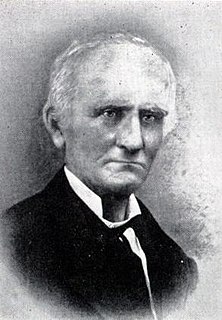
Jonathan Worth was the 39th governor of the U.S. state of North Carolina from 1865 to 1868, during the early years of Reconstruction.

Montfort Stokes was an American Democratic politician who served as U.S. Senator from 1816 to 1823, and the 25th Governor of North Carolina from 1830 to 1832.
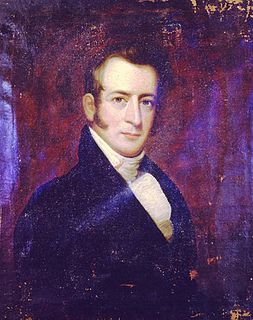
John Owen was the 24th Governor of the U.S. state of North Carolina and the first Democrat NC Governor from 1828 to 1830.

James Turner was the 12th Governor of the U.S. state of North Carolina from 1802 to 1805. He later served as a U.S. senator from 1805 to 1816.
John Haywood was an American politician, who was the longest-serving North Carolina State Treasurer.
The North Carolina General Assembly of 1779 met in three sessions in three locations in the years 1779 and 1780. The first session was held in Smithfield from May 3 to May 15, 1779; the second session in Halifax, from October 18 to November 10, 1779; the third and final session in New Bern, from January to February, 1780.
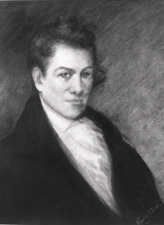
Israel Pickens was an American politician and lawyer, third Governor of the U.S. state of Alabama (1821–1825), member of the North Carolina Senate (1808–1810), and North Carolina Congressman in the United States House of Representatives (1811–1817).
Richard Hancock Moore was the North Carolina State Treasurer from 2001–2009. He was first elected to that post in 2000 and re-elected in 2004.

Kemp Plummer Battle was an American lawyer, railroad president, university president, educator, and historian. He served as North Carolina State Treasurer and as president of the University of North Carolina in the nineteenth century.
Memucan Hunt (1729–1808) was an early American statesman and the first person to hold the position of North Carolina State Treasurer in its current form.
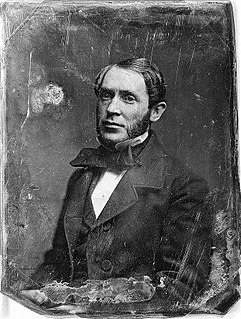
John Hill Wheeler (1806–1882) was an American planter, slaveowner, attorney, politician and historian who served as North Carolina State Treasurer (1843–1845) and as United States Minister to Nicaragua (1855–1856).
Jethro New was an 18th-century American frontiersman and Continental Army officer during the American Revolutionary War, at one time serving as an aide to General George Washington. He was a prominent settler in North Carolina and Kentucky as well as being among the first families to arrive in Jennings County, Indiana.
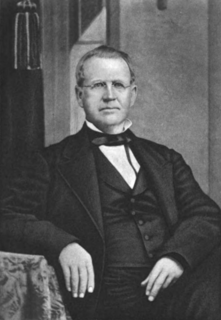
Samuel Finley Patterson was a North Carolina politician, planter, and businessman.
William Cage was an American politician in North Carolina and Tennessee and an early settler in Tennessee. He was a member of the North Carolina House of Representatives in 1783 and 1784. He briefly held the position of State Treasurer and Speaker of the State House of Representatives in the 18th century, from August 1784 to June 1785, representing the proposed State of Franklin.
The North Carolina Council of State elections of 2020 will be held on November 3, 2020 to select the ten officers of the North Carolina Council of State. These elections coincide with the presidential election, elections to the House of Representatives, elections to the Senate and elections to the North Carolina General Assembly and top state courts. Primary elections were held on March 3, 2020, for offices for which more than one candidate filed per party.
The North Carolina General Assembly of 1862–1864 met in Raleigh from November 17, 1862 to December 22, 1862. Extra sessions were held on January 19, 1863–February 12, 1863; June 30, 1863–July 7, 1863; November 23, 1863–December 14, 1863; and May 17–30 1864. The assembly consisted of the 120 members of the North Carolina House of Commons from 82 counties and 50 senators representing one or more counties in North Carolina Senate elected by the voters in October 1862. Zebulon Baird Vance was Governor of North Carolina during this assembly. This assembly met during the American Civil War as part of the Confederate States of America. Much of the legislation passed by this assembly dealt with the managing the state and its population during wartime.
References
| Political offices | ||
|---|---|---|
| Preceded by John Haywood | Treasurer of North Carolina 1827–1830 | Succeeded by William S. Mhoon |
| This article about a North Carolina politician is a stub. You can help Wikipedia by expanding it. |